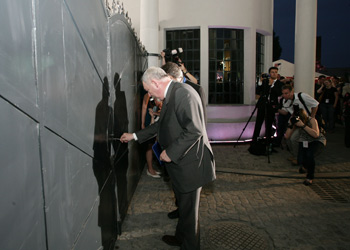Perspectives on Poland: Museum City
One Sunday afternoon last month saw me on a long-anticipated visit to the Krakow Under Nazi Occupation exhibition at the Schindler Factory. A lot of people have made positive noises about this exhibition and I wasn’t disappointed. It closely follows the highly successful example set by the Warsaw Uprising Museum – lots of original documents, photographs and personal objects in immersive settings enhanced with sound effects and interactive elements. It’s a long way from the glass display cases and dusty corridors traditionally associated with the museum experience.
If I were forced to offer a criticism, it would be that there is an over-reliance on long, written explanations and, inexplicably and inexcusably, that the English versions of these are far from grammatically perfect. This is a fault that infuriates me – it’s so easily avoidable and so unnecessarily embarrassing in an attraction that will draw millions of English-speaking visitors. But I’m probably the only person in the world who is bothered by these things, so I’ll shut up about that.
What I really want to talk about is something that occurred to me as I was weaving my way through the elaborate fakery of the Podgórze Ghetto exhibit behind a gaggle of American tourists. There is something dizzyingly disconcerting about the experience. The venue for the exhibition, the Schindler Factory, is famous because of the film based on the book about the exploits of its wartime owner and the Jewish people who worked there. The weirdness sets in when you realise you are inside a genuine historical monument looking at ersatz versions of the period that it represents. There is even a reproduction of the ghetto wall, real fragments of which are a few hundred metres away outside.
This is not a criticism of the exhibition, I think it’s probably a sensible use for a building that would otherwise be a useless shell, but it is a striking example of a phenomenon that is becoming more and more common in Krakow — the commercialisation of history. In many ways the historical centre of the city has become a parody of itself. The truth is that the Old Town is, essentially, just an exhibit. Real life stopped happening there years ago. Almost every building is dedicated to meeting the needs of tourists either as an entertainment venue or as a place to stay. Tourists wander around looking at the charming streets and buildings, blissfully unaware that all they are seeing are the temporary homes and hangouts of other tourists.
There are a few holdouts: an old-fashioned fur coat shop on Floriańska, an inexplicable gardening shop on Szpitalna, and the odd underground bar that is still a genuine student hangout. The university itself, the one institution that continued to breathe life into the ancient city, is moving en masse to a new campus in the suburbs.
None of this amounts to a new observation; plenty of people have been wailing about the same thing for years. Where I differ is that I wholeheartedly support the phenomenon. Cities like Krakow are at the forefront of a global paradigm shift in the use of urban space — from the city as industrial and commercial centre to the city as entertainment and leisure venue. It looks scary and depressing from our perspective, but when the story of this century is written I believe it will recognise this shift in the evolution of the world’s “heritage” cities as profound and influential. History hasn’t stopped, it’s just taken a new and unfamiliar turn.
Jamie Stokes also writes for Polandian.


Hi
My wife and I were in Krakow in January this year for a couple of days, all too briefly may I add, and part of the appeal for us was the ‘untouched’ feel of the city. It hadn’t been scrubbed up and neither Americanised or overly modernised. We also felt that not joining the Euro currency was still to Krakow’s advantage. We plan to return and stay a few days longer this time.